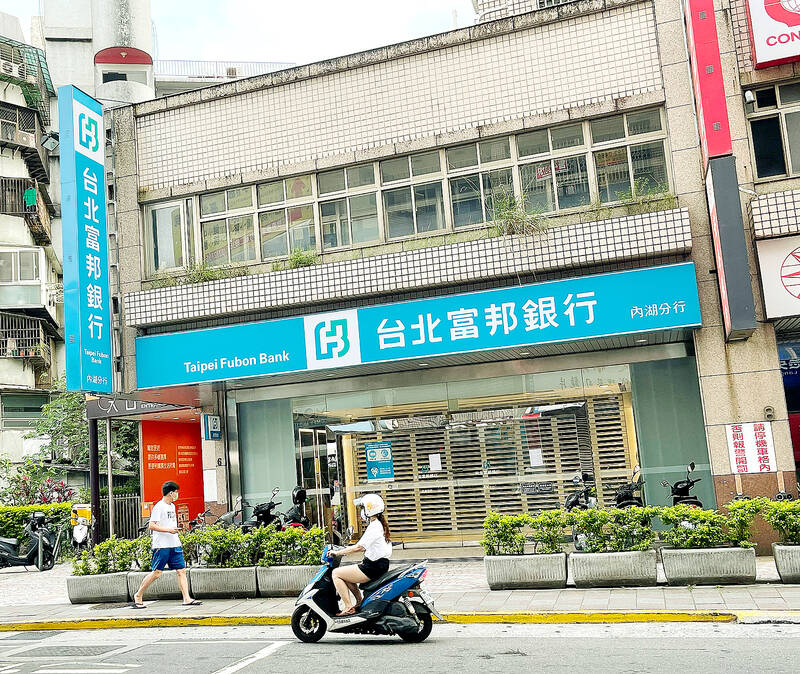Taipei Fubon Commercial Bank (台北富邦銀行) has obtained regulatory approval to merge with Jih Sun International Bank (日盛銀行), after parent Fubon Financial Holding Co (富邦金控) completed its acquisition of Jih Sun Financial Holding Co (日盛金控) in November last year.
After the deal takes effect on April 1, Jih Sun International Bank would cease to exist and Fubon would become the nation’s third-largest bank in terms of assets, the Financial Supervisory Commission said on Tuesday.
Taipei Fubon Bank’s assets would expand to NT$4.27 trillion (US$140.77 billion) from NT$3.99 trillion, behind Bank of Taiwan’s (臺灣銀行) NT$5.95 trillion and CTBC Bank Co’s (中信銀行) NT$4.57 trillion, the commission said.

Photo: CNA
Taipei Fubon and Jih Sun Bank said the merger would provide wider business deployment and allow for better customer services.
They also expect it to help promote resource integration and increase market competitiveness.
Taipei Fubon Bank would retain all employees and 44 branches of Jih Sun Bank, raising its total number of branches to 179, the largest among private banks and the fifth-largest among all banks, Banking Bureau Chief Secretary Hou Li-yang (侯立洋) said.
It would also boost its market shares in the deposit and loan businesses in Taiwan, Hou said.
Taipei Fubon Bank posted a record net profit of NT$22.64 billion last year, up 21 percent year-on-year, thanks to higher fee incomes and investment gains.
However, Fubon Financial’s pre-tax profit of NT$60.6 billion last year fell short of market expectations, as its insurance arm was burdened by COVID-19-related claims, regulatory filings showed last week.
Fubon Financial last week announced that it would recruit 6,500 people to meet increasing demand for the company and its subsidiaries’ services.
The new openings range from overseas business development to information technology and security, data analytics, customer service and risk management, the company said.
The company would also recruit 50 to 60 management associates, it said.
The new hires are to start working in March, it added.

In Italy’s storied gold-making hubs, jewelers are reworking their designs to trim gold content as they race to blunt the effect of record prices and appeal to shoppers watching their budgets. Gold prices hit a record high on Thursday, surging near US$5,600 an ounce, more than double a year ago as geopolitical concerns and jitters over trade pushed investors toward the safe-haven asset. The rally is putting undue pressure on small artisans as they face mounting demands from customers, including international brands, to produce cheaper items, from signature pieces to wedding rings, according to interviews with four independent jewelers in Italy’s main

Japanese Prime Minister Sanae Takaichi has talked up the benefits of a weaker yen in a campaign speech, adopting a tone at odds with her finance ministry, which has refused to rule out any options to counter excessive foreign exchange volatility. Takaichi later softened her stance, saying she did not have a preference for the yen’s direction. “People say the weak yen is bad right now, but for export industries, it’s a major opportunity,” Takaichi said on Saturday at a rally for Liberal Democratic Party candidate Daishiro Yamagiwa in Kanagawa Prefecture ahead of a snap election on Sunday. “Whether it’s selling food or

CONCERNS: Tech companies investing in AI businesses that purchase their products have raised questions among investors that they are artificially propping up demand Nvidia Corp chief executive officer Jensen Huang (黃仁勳) on Saturday said that the company would be participating in OpenAI’s latest funding round, describing it as potentially “the largest investment we’ve ever made.” “We will invest a great deal of money,” Huang told reporters while visiting Taipei. “I believe in OpenAI. The work that they do is incredible. They’re one of the most consequential companies of our time.” Huang did not say exactly how much Nvidia might contribute, but described the investment as “huge.” “Let Sam announce how much he’s going to raise — it’s for him to decide,” Huang said, referring to OpenAI

The global server market is expected to grow 12.8 percent annually this year, with artificial intelligence (AI) servers projected to account for 16.5 percent, driven by continued investment in AI infrastructure by major cloud service providers (CSPs), market researcher TrendForce Corp (集邦科技) said yesterday. Global AI server shipments this year are expected to increase 28 percent year-on-year to more than 2.7 million units, driven by sustained demand from CSPs and government sovereign cloud projects, TrendForce analyst Frank Kung (龔明德) told the Taipei Times. Demand for GPU-based AI servers, including Nvidia Corp’s GB and Vera Rubin rack systems, is expected to remain high,